Does Climbing Hard Matter?
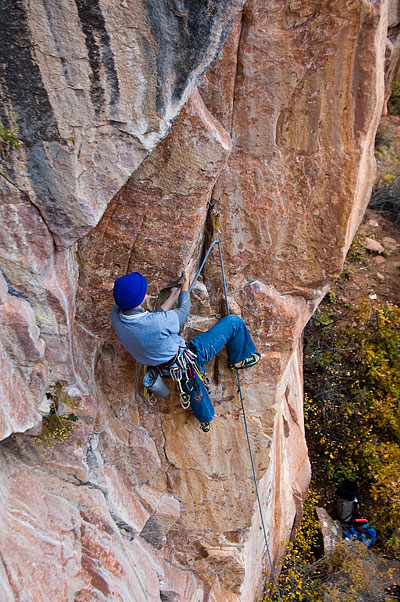 In his latest TNB, Andrew Bisharat asks if hard climbing matters. You know, all those folks out there crushing routes that are impressively difficult. It’s easy to dismiss his question with a simple no, all that matters is having fun, but I think there’s more to it than that, and to pass it off so easily does a disservice to what you can get out of actually trying to climb “hard.” **
In his latest TNB, Andrew Bisharat asks if hard climbing matters. You know, all those folks out there crushing routes that are impressively difficult. It’s easy to dismiss his question with a simple no, all that matters is having fun, but I think there’s more to it than that, and to pass it off so easily does a disservice to what you can get out of actually trying to climb “hard.” **
Trying hard in climbing is one of the more incredible experiences you can have. Drawing upon all your skill, your strength, your mental fortitude to move yourself up a rock, it’s so meaningless, and yet can be profound on so many levels.
How we climb is often a reflection of how we react to many things in life, and in that sense, perhaps climbing hard can help us improve upon certain character flaws that are holding us back, both on the rock and in life itself. I used to have a big hang up with climbing in front of other folks, how my friends at Rifle might see me struggling on their warms ups, and oh no, what will they think? That’s some heavy baggage to be carrying around, and was an energy sink that wasn’t making getting up said “warm ups” any easier.
Once I learned to cast off that baggage, and focus instead on the process of figuring out a new route, my enjoyment of climbing greatly improved. I stopped worrying about what others thought, and instead focused on my experience, pushing myself harder, and learning new things about what I’m capable of. And in that sense, climbing “hard” helped me move past this thing that was not just weighing me down in climbing, but probably in other areas of life as well.
We live a safe and comfortable existence as Americans, but climbing hard gives us a chance to step outside that comfort, and that’s where real learning and discovery can occur. It can, of course, be scary and unnerving, and there’s nothing wrong with going out and keeping things mellow, and enjoying the simple act of climbing for what it is. But for me, climbing “hard” is where I learn the most about myself, and in that sense, yeah, it matters.
How about for you, does climbing “hard” matter?
** “hard” is obviously relative to each individual, and I’ve put it in quotes to denote that “hard” is whatever level you personally find challenging or difficult.
7 Responses to Does Climbing Hard Matter?
Bulldog Creek Dog Walk (IV WI 4+)
Hayden Carpenter and Tom Bohanon recently repeated an obscure ice climb on the south side of Mt Sopris. Given a brief mention in Jack Robert’s ice guide, Bulldog Creek Walk is described as being 100 meters of WI 4. What they found was seven pitches of ice in a remote setting that makes for one […]
Connect with Us








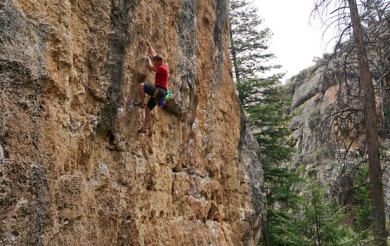
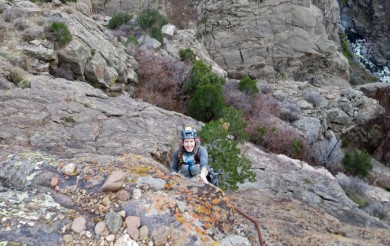
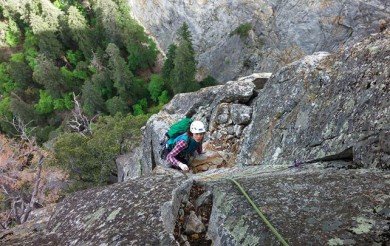
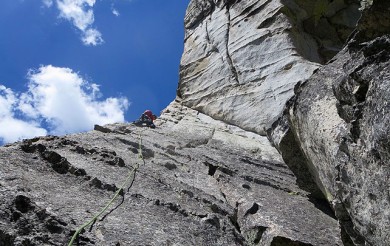



nice one dude!
This is a well written post, but it makes an unjustified leap that is often made by climbers – that how we deal with climbing is a reflection of how we react to life and that climbing “hard” helps in other areas of life. I have seen too many climbers that are incredibly self-absorbed, and in general not great human beings, who displayed no personal growth while tackling hard projects that got them to set goals, work hard, and defer gratification. It is a puzzle as to why climbing doesn’t carry over to life in most cases (I leave some room here). Is it that the brain is wired such that different parts are needed to climb well versus live a life worth living? At the risk of drawing unrelated debate, Lance Armstrong could be thought of as an example of someone who seems to have learnt little out of overcoming Cancer, and out of cycling *hard*.
As a counterpoint to this rant, I have seen some great human beings make good climbers that climb very hard indeed, but I highly doubt that they needed climbing to make them so. So in that sense, I dont think that anyone climbing *hard* matters to me at least. Finally, climbing is meditative in many ways, so it does help deal with life and reset your subconscious, but so can any other activity such as actual meditation.
Vivek,
In my experience, our rock climbing is almost an exact reflection of how we do other things in life. Afraid to take risks? Try to get a lot done in a day? Prefer to rehearse something rather than make a cold call on the go? Believe me, there are plenty of selfish folks out there who will use it for whatever they want, I was simply offering one perspective of how/why it could actually matter. Thanks for stopping by!
Absolutely! I really like both your post and the original by Bisharat. I think it definitely matters and on several levels. It’s too easy to dismiss everything that doesn’t cure cancer as irrelevant. The fact is that it doesn’t need to cure cancer to contribute to the world. If just ONE other person climbs a route that someone has put up and gets joy from the experience or learns a lesson then something was added to the world. And that’s not even considering the personal experiences of the first ascensionist.
Enjoying the experiences in life and helping other enjoy theirs is something that’s very under rated in our country. Instead, we often try to enjoy the things in life which in the end always falls short of the experiences we could have had.
Climbing hard for your grade and for yourself is probably more important then climbing 5.12 or higher. When I started off, I was motivated to get to 5.10. That was the goal. Getting there took a long time, but the want to climb harder helped me get where I wanted. The thing that subsequently got me there was learning how relax and move through the moves that I needed to learn. And that was a lesson in itself.
What I respect in “hard” climbing is that those who have worked to climb at a high level strive for mastery of a skill. While this may not relate to the rest of their life in any way, the climber has dedicated themselves to perform at their highest possible level on the rock, to attain a moment that is as close to in sync with our surroundings despite (or even because of) the difficulty of a given route. Sendy McShortstack might be an asshole, but when s/he is in the moment, trying his/her hardest, and succeeding at his/her personal limit, it is a beautiful thing to watch, and an incredible thing to experience firsthand. I don’t think that the grade in and of itself matters, instead it is a yardstick in which to measure your own personal growth. Watching someone try their hardest on a 5.11 to me is more interesting than someone warming up on a 5.13.
I am new to climbing. It’s been about two months of 2-4 days a week, depending on schedule, weather, finance etc. I used to be a “pro” bike rider and have been skateboaring most of my life. Everyone I meet talks about climbing in totally different ways. Some seem to use it as a cathartic activity, a way to reset or forget. Others have notebooks with checklists of routes and grades and goals. I started out on a 5.7, bouldering at a v1-2. At two months in I’ve sent a couple v4’s flashed a 5.10. I am moving really fast, but I know I will plateau and start to have to work really really hard to finish a 5.12 or something like that. What I have learned is that this idea of “hard” climbing is totally subjective. a 5.10 slab, top to bottom,is waaayyy harder to me than a 5.10 with a v4 boulder problem at the start and an overhang to finish. within a grade on two different climbs, one i can flash the other takes me all day to piece together. from spinning my bike around to learning how to place my fingers on a crimp vs a sloper, I’ve learned that “hard” is relative to the understanding of the individual. I can intuit a stair set on my bike, i know that the pitch and amount of stairs requires a certain speed and i can read that without much effort, but hopping over a stretched chain is the scariest thing in the world to me and requires hours of prep to decide how to approach. at what point do climbers stop ticking of grades and start focusing on the fact that they cant send a route with too many gastons involved? it seems that technique, above and beyond anything else, is the key to being a dynamic climber and that climbing “hard” is more a matter of being unfamiliar territory. am i wrong here? is this just me being new?